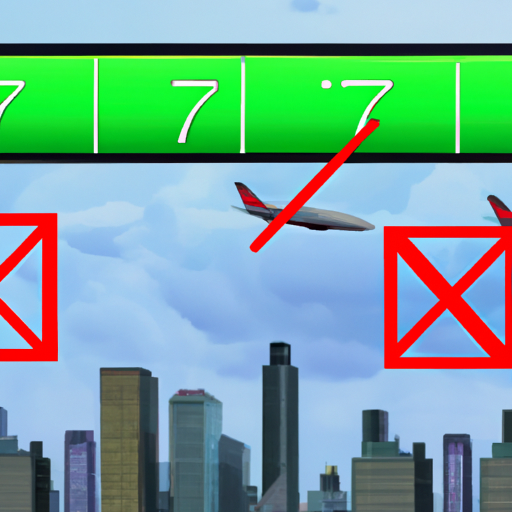
The Pros and Cons of Hidden City Ticketing in Air Travel
Hidden city ticketing is a concept that has gained popularity among savvy travelers looking for ways to save money on air travel. It involves booking a flight with a layover in the desired destination, but intentionally missing the connecting flight and disembarking at the layover city. While this may seem like a clever way to cut costs, there are both pros and cons to consider before attempting hidden city ticketing.
One of the main advantages of hidden city ticketing is the potential for significant savings. By booking a flight with a layover in the desired destination, travelers can often find cheaper fares compared to direct flights. This is especially true for popular routes where airlines may charge a premium for nonstop flights. By taking advantage of hidden city ticketing, travelers can save money without compromising on their travel plans.
Another benefit of hidden city ticketing is the flexibility it offers. Since travelers are not bound by the final destination of their ticket, they have the freedom to explore the layover city or use it as a starting point for their journey. This can be particularly appealing for those who enjoy spontaneous travel or want to visit multiple destinations without incurring additional costs.
However, hidden city ticketing also comes with its fair share of drawbacks. One of the main disadvantages is the risk of complications and inconvenience. Airlines have strict policies regarding hidden city ticketing, and if they discover that a passenger has intentionally missed a connecting flight, they may impose penalties or even cancel the remaining itinerary. This can result in unexpected expenses and disruptions to travel plans.
Furthermore, hidden city ticketing can be a gamble when it comes to baggage. If a traveler checks their luggage, it will typically be tagged to the final destination on the ticket. If they choose to disembark at the layover city, there is a chance that their bags will continue to the final destination without them. This can be particularly problematic if the traveler has important belongings or necessities in their checked baggage.
Another potential downside of hidden city ticketing is the limited availability of flights. Since this strategy relies on finding flights with layovers in the desired destination, it may not always be feasible or practical. Travelers may have to compromise on their preferred travel dates or times, which can be inconvenient for those with strict schedules or time constraints.
In addition, hidden city ticketing can have ethical implications. Airlines argue that it is a form of fare evasion and can lead to higher prices for other passengers. By intentionally bypassing the final leg of a flight, travelers are essentially taking advantage of pricing structures and potentially disrupting the airline’s revenue model. This has led to legal battles and controversies surrounding the practice of hidden city ticketing.
In conclusion, hidden city ticketing can be a cost-effective and flexible option for travelers looking to save money on air travel. However, it is important to weigh the pros and cons before attempting this strategy. The potential for savings and freedom to explore new destinations are enticing, but the risk of penalties, baggage complications, limited flight availability, and ethical concerns should not be overlooked. Ultimately, it is up to each individual traveler to decide whether hidden city ticketing aligns with their travel preferences and priorities.
How Hidden City Ticketing Works and its Impact on Airlines

Hidden city ticketing is a concept that has gained popularity among savvy travelers looking for ways to save money on air travel. It involves booking a flight with a layover in a desired destination, but intentionally getting off at the layover city instead of continuing to the final destination. This practice can result in significant savings, but it also has its drawbacks and implications for airlines.
So, how does hidden city ticketing work? Let’s say you want to fly from New York to Los Angeles, but the direct flight is quite expensive. Instead, you find a flight from New York to San Francisco with a layover in Los Angeles that is significantly cheaper. You book the ticket and simply get off the plane in Los Angeles, skipping the second leg of the journey. This way, you have effectively used the layover city as your final destination, saving money in the process.
The impact of hidden city ticketing on airlines is a complex issue. On one hand, it can lead to revenue loss for airlines. When passengers book hidden city tickets, they are essentially taking up a seat on a flight but not paying the full fare. This means that airlines are not generating the expected revenue from these passengers. Additionally, hidden city ticketing can disrupt airline operations, as passengers who do not continue to their final destination may cause delays or complications in baggage handling.
To combat hidden city ticketing, airlines have implemented various measures. One common practice is to prohibit hidden city ticketing in their terms and conditions. If an airline discovers that a passenger has engaged in this practice, they may take action, such as canceling the remaining legs of the ticket or even banning the passenger from future flights. Some airlines have also filed lawsuits against websites that facilitate hidden city ticketing, claiming that they encourage fraudulent behavior.
Despite the potential drawbacks for airlines, hidden city ticketing continues to be a popular strategy for budget-conscious travelers. It allows them to save money on airfare, especially for long-haul flights or routes with limited competition. However, it is important to note that hidden city ticketing comes with risks and limitations. For example, passengers who engage in this practice cannot check luggage to their final destination, as it will be offloaded at the layover city. Additionally, hidden city ticketing is not recommended for frequent flyers or those who rely on loyalty programs, as it can jeopardize their status and benefits.
In conclusion, hidden city ticketing is a concept that offers potential savings for travelers but has implications for airlines. It involves booking a flight with a layover and intentionally getting off at the layover city instead of continuing to the final destination. While it can result in revenue loss and operational challenges for airlines, hidden city ticketing remains a popular strategy for budget-conscious travelers. However, it is important to consider the risks and limitations associated with this practice before deciding to book a hidden city ticket.
Legal and Ethical Considerations of Hidden City Ticketing in Air Travel
Hidden city ticketing is a concept that has gained popularity among savvy travelers looking for ways to save money on air travel. However, it is important to understand the legal and ethical considerations associated with this practice. In this section, we will explore the legal implications of hidden city ticketing and discuss the ethical concerns that arise from it.
From a legal standpoint, hidden city ticketing can be a tricky area to navigate. Airlines have strict rules and regulations in place to protect their revenue and ensure the smooth operation of their flights. Hidden city ticketing involves booking a flight with a layover at the desired destination, but intentionally getting off at the layover point instead of continuing to the final destination. This allows travelers to save money by booking a cheaper flight to the layover city instead of the final destination.
However, airlines consider hidden city ticketing to be a violation of their terms and conditions. They argue that it is a breach of contract as passengers are not using the ticket as intended. In some cases, airlines have taken legal action against travelers who engage in hidden city ticketing, seeking compensation for the revenue lost due to this practice. It is important for travelers to be aware of the potential legal consequences before deciding to engage in hidden city ticketing.
Aside from the legal implications, hidden city ticketing also raises ethical concerns. Critics argue that it is unfair to airlines and other passengers. By intentionally not using the ticket to the final destination, travelers are taking up a seat that could have been used by someone else. This can lead to overbooking issues and inconvenience for other passengers. Additionally, hidden city ticketing can disrupt airline revenue management systems, making it more difficult for airlines to offer competitive prices and maintain profitability.
Furthermore, hidden city ticketing can have a negative impact on loyalty programs. Many airlines offer frequent flyer programs that reward passengers for their loyalty. These programs are designed to encourage repeat business and build customer loyalty. However, hidden city ticketing can be seen as a way to exploit these programs by earning miles or points without actually flying the required distance. This can undermine the integrity of loyalty programs and devalue the benefits they offer to genuine customers.
In light of these legal and ethical considerations, it is important for travelers to carefully weigh the pros and cons of hidden city ticketing. While it may offer significant cost savings, it is essential to understand the potential risks involved. Travelers should familiarize themselves with the terms and conditions of the airline they are booking with and consider the potential legal consequences. Additionally, it is important to consider the impact of hidden city ticketing on other passengers and the airline industry as a whole.
In conclusion, hidden city ticketing is a practice that can save travelers money on air travel, but it comes with legal and ethical considerations. Airlines view it as a breach of contract and have taken legal action against travelers who engage in this practice. Ethically, hidden city ticketing raises concerns about fairness to airlines and other passengers, as well as the impact on loyalty programs. Travelers should carefully consider these factors before deciding to engage in hidden city ticketing.


